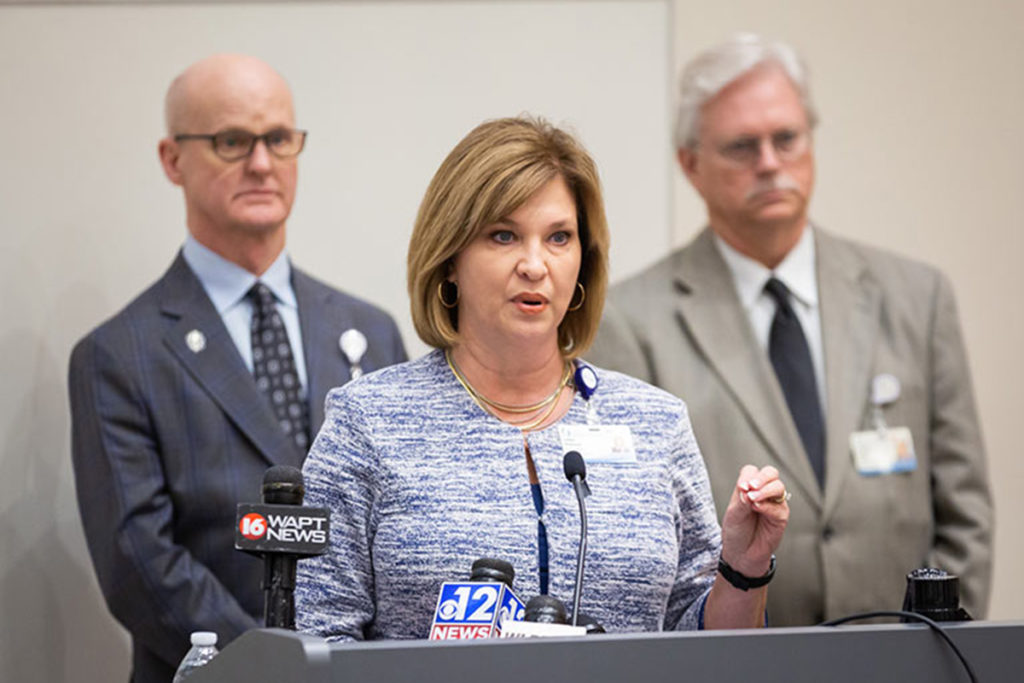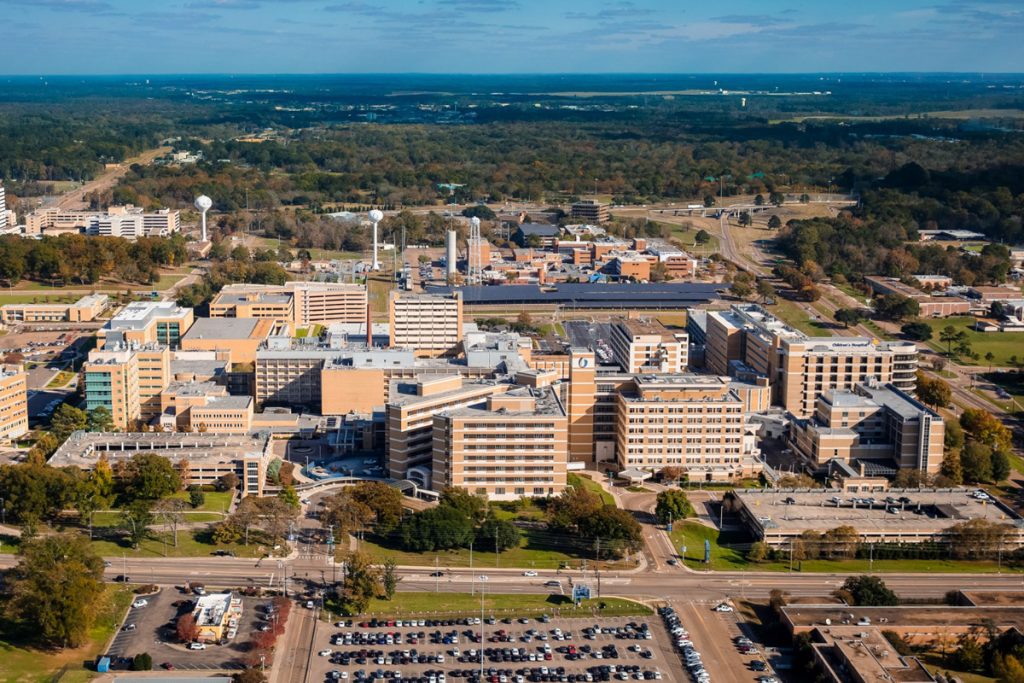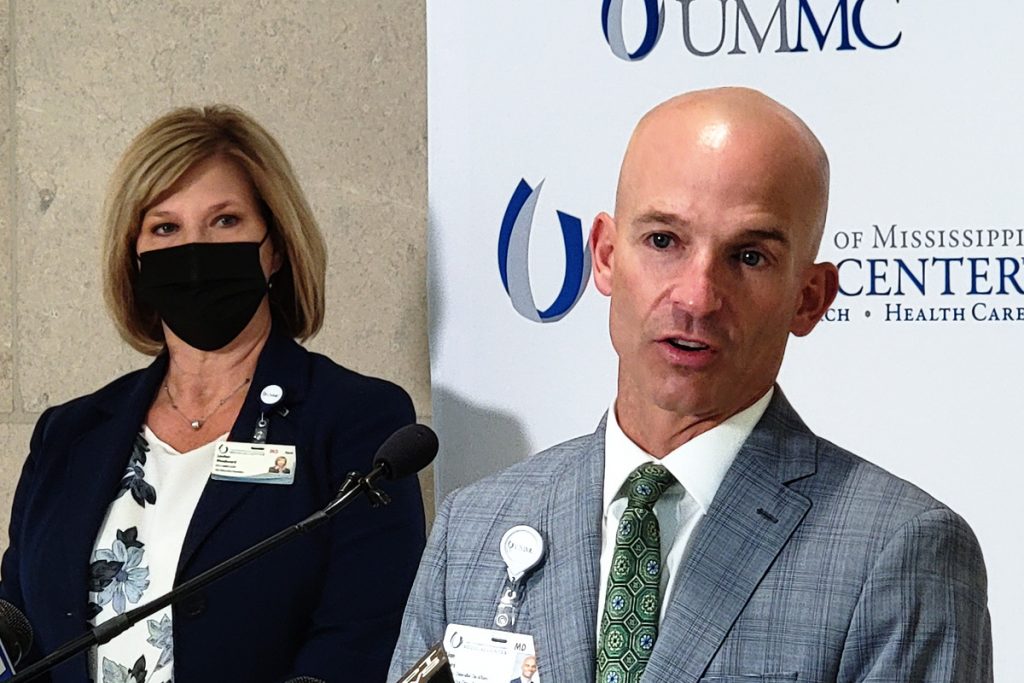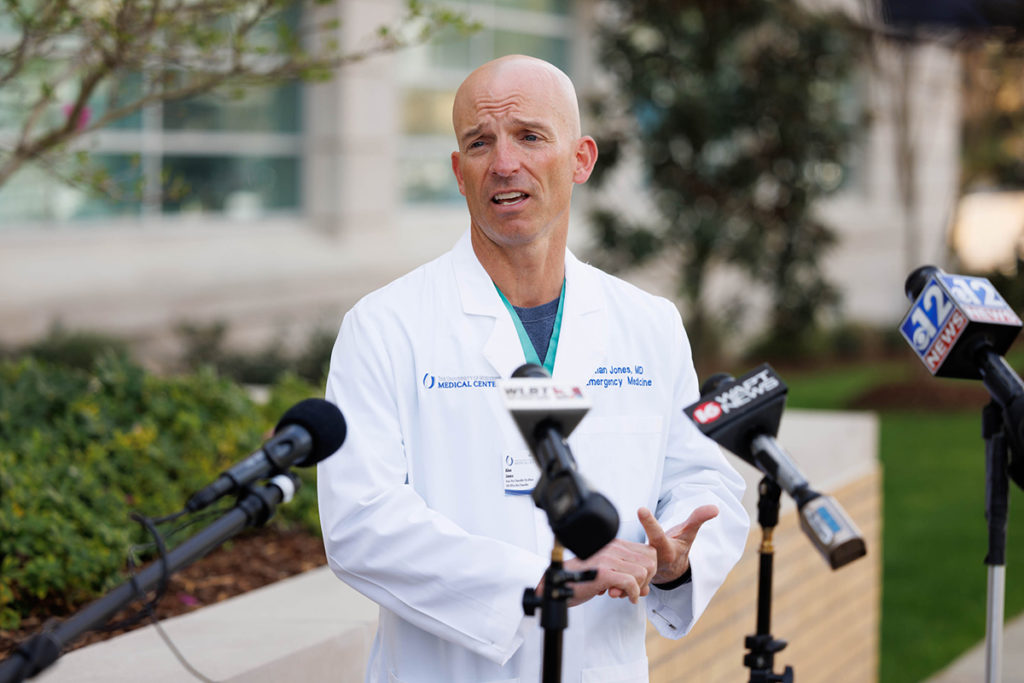A contract dispute over reimbursement rates between the University of Mississippi Medical Center and Blue Cross Blue Shield of Mississippi has resulted in the hospital going out of network today, April 1. This move will cause a serious spike in the cost of health-care services for customers of one of the state’s largest insurers at Mississippi’s largest public hospital system.
Out-of-network charges are often prohibitively expensive, with insurance providers paying significantly less of the agreed-upon rate, and with additional charges passing on to the patients. Patients who use out-of-network medical services can usually expect to pay thousands of dollars more for care than those who seek treatment in the network.
Virtually all Blue Cross-insured patients will lose in-network coverage after this change, including those who have insurance through Blue Cross providers in other states or on the federal level. Only members of the State and School Employees’ Health Plan, which Blue Cross manages, will remain in network.
Since 2018, UMMC has maintained that the insurance giant should pay the hospital system larger reimbursements for care its hospitals provide, bringing UMMC’s compensation more in line with other academic medical centers in nearby states.
Dr. LouAnn Woodward, UMMC vice chancellor for health affairs and dean of the School of Medicine, released a statement Monday challenging Blue Cross’ rejection of the hospital’s request for rate hikes.

“Blue Cross wants to compare us to other Mississippi hospitals, but there are no hospitals in the state that are like us. Every day we treat patients across Mississippi, many with nowhere else to turn, because they need the specialty physicians found only here at UMMC. We should be compared to other academic medical centers and safety net hospitals just like us,” Woodward wrote.
In a response to queries from the Mississippi Free Press, Blue Cross’ Corporate Communications Manager Cayla Mangrum denied that UMMC could compare itself to other academic medical centers, and provided a statement contradicting UMMC.
“UMMC’s press release is full of inaccuracies and misleading statements,” Mangrum wrote in part. “Blue Cross & Blue Shield of Mississippi has been trying to work with UMMC since early 2021 to renew their network hospitals, but UMMC’s demands have made it very difficult to finalize an agreement.”
In a second statement, Mangrum went further. “There is no justification to pay UMMC more, for example, for an X-ray or bypass surgery, than it would any other Network Provider offering the same service,” she wrote.
Remaining Patients In Three Tiers
Dr. Alan Jones, UMMC associate vice chancellor for clinical affairs and professor of emergency medicine, spoke with the Mississippi Free Press on March 29 to explain the consequences for Mississippians with Blue Cross insurance.
Critically, Jones confirmed that the hospital would continue to accept in-network payments for emergency patients routed to UMMC with Blue Cross insurance, due to requirements of the Emergency Medical Treatment and Active Labor Act, or EMTALA.
“Emergency patients—patients that suffer from conditions where they have no choice in their positions—all of those patients would continue to have in-network coverage,” Jones said. “The example being a pregnant patient who goes into labor and is brought here and delivers the baby, who then goes to the neonatal intensive-care unit. … We would continue to accept in-network payments for them, because they are emergencies, not elective treatment.”

But UMMC provides important medical services not available elsewhere in the state. For non-emergency situations, necessary treatment may become prohibitively expensive at the only hospital in Mississippi capable of offering the proper level of care.
“For example,” Jones continued, “if you need a bone-marrow transplant, we have the only bone marrow transplant in the state. Well, those patients wouldn’t be able to access that program. So it would, they would have to call Blue Cross to find out where Blue Cross wants them to go to get that treatment.
Representatives from UMMC and Blue Cross confirmed that, when UMMC goes out of network, Blue Cross-insured patients will be broken down into three tiers. Blue Cross will continue to fully cover emergency patients described above, but new patients would need to either pay out-of-network costs or find another hospital in the network for their care, even if that would mean traveling to other states.
Blue Cross-insured patients currently receiving ongoing care at UMMC prior to the end of the contract period on April 1, and who need UMMC to continue providing care, have a 90-day transition period lasting until June 30. In that transition period, patients will continue to be billed at in-network rates, after which they will move off-network as well.
UMMC Significantly Underpaid?
The impasse between UMMC and Blue Cross boils down to the value of the hospital complex to Blue Cross’ overall network. UMMC is seeking recognition of the unique role the hospital plays in Mississippi’s health-care ecosystem. To Blue Cross, the hospital is not significantly different from any other providers in the state.
“We obviously have the opinion that we are different because we have a lot of unique services,” Jones said. “To have those services results in a higher cost structure.”
“(We’re an) academic medical center, and just like the other academic medical centers in our region, (we) demand a different reimbursement rate than other hospitals,” he continued. “What they’ve said to us is ‘we have an adequate network without UMMC in it.’ … By virtue of not negotiating with us, that signals that they don’t believe they need us in their network.”
Ultimately, Jones says, UMMC is only asking to be paid close to what other academic medical centers in the region offer. “In our region, an academic medical center is (typically) paid above 200% of Medicare,” he explained.

This metric compares payments for service from Medicare to private insurance, which is typically higher. “We are not even asking to get to 200%. … We’re asking for a 30% rate increase across all of our contracts. That won’t even get us two thirds of the way to where other academic medical centers are. … It is a significant ask, but it’s because we have been significantly underpaid for so long now.”
Mangrum did not dispute Jones’ numbers, but denied that UMMC is underpaid. “Blue Cross & Blue Shield of Mississippi has offered UMMC increases in payment for unique services UMMC provides, such as trauma, transplants and certain pediatric services,” she wrote. “However, services available at other Network Providers are paid consistently based upon the Mississippi market rate.”
Mangrum’s statement disputed the comparative value of UMMC. “As to UMMC’s claim to be paid more as an academic medical center, UMMC is comparing themselves to institutions they are not,” she wrote. “For example, UMMC’s publicly reported quality scores are lower than other nearby academic medical centers where our Members frequently seek services. It is important to remember UMMC is funded through the State of Mississippi, not by Blue Cross Blue Shield Members.”
To this statement, UMMC’s Executive Director of Communications and Marketing Marc Rolph provided a list of Leapfrog scores for UMMC and some other academic medical centers in the regions. UMMC’s C rating placed it on par or higher than some large academic hospitals in New Orleans, La., Lexington, Ky., Mobile and Birmingham, Ala., Miami, Fla. and Little Rock, Ark. Some academic hospitals in the same states, however, have received A and B rankings.
‘The Dominant Insurer’
Mangrum repeatedly challenged the assertion that UMMC had been underpaid in her statement, explaining that the current reimbursement rates had included a rate increase. “UMMC has not been underpaid,” she began. “Any payment made to UMMC was based on a mutually agreed upon and executed Network Agreement, with the most recent agreement being in 2018. … UMMC had every opportunity to continue its negotiation and not agree to anything.”
Jones countered that the 2018 negotiations had brought forward decades-old language and that UMMC had clearly requested higher reimbursement rates at the time. “Six years ago we had contract language written when Dr. Woodward was in medical school. … We got all that contract language straightened out to be more modern and fair,” he said.
“We told them back in 2018 that we’d be coming back for negotiation, and it would be all right the next time, because we did not feel that we were fairly reimbursed the way an academic medical center should be.”
Jones said Blue Cross’ market dominance allowed it to control reimbursement—a trend UMMC is now attempting to fight. “The real issue here has been that (Blue Cross) have managed—because they’re the dominant insurer in the market—to keep hospital and physician reimbursement very, very low,” he said.
Mangrum’s statement closed with a quote from Blue Cross Blue Shield of Mississippi Chief Medical Officer Dr. Tom Fenter. “The health of our Members is important. Ensuring they have access to cost-effective, quality healthcare is our commitment and priority,” Fenter wrote. “UMMC’s media campaign and tactics will not distract us from that commitment.”










